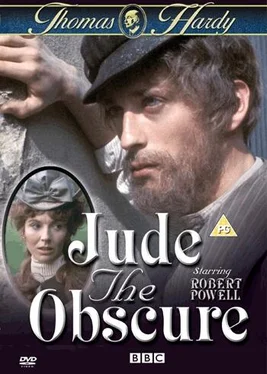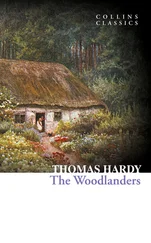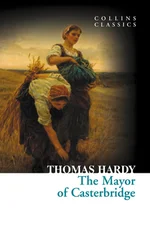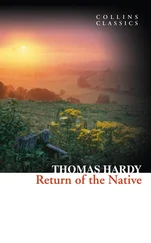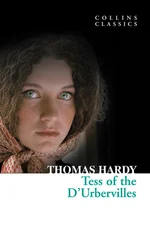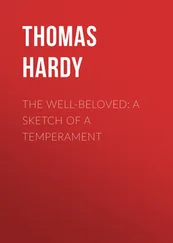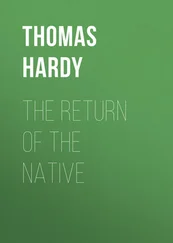"That's a good intention wasted!" said she.
Jude did not respond. He thought the remark unnecessarily cruel, and partly untrue.
They reached the park and castle and wandered through the picture-galleries, Jude stopping by preference in front of the devotional pictures by Del Sarto, Guido Reni, Spagnoletto, Sassoferrato, Carlo Dolci, and others. Sue paused patiently beside him, and stole critical looks into his face as, regarding the Virgins, Holy Families, and Saints, it grew reverent and abstracted. When she had thoroughly estimated him at this, she would move on and wait for him before a Lely or Reynolds. It was evident that her cousin deeply interested her, as one might be interested in a man puzzling out his way along a labyrinth from which one had one's self escaped.
When they came out a long time still remained to them and Jude proposed that as soon as they had had something to eat they should walk across the high country to the north of their present position, and intercept the train of another railway leading back to Melchester, at a station about seven miles off. Sue, who was inclined for any adventure that would intensify the sense of her day's freedom, readily agreed; and away they went, leaving the adjoining station behind them.
It was indeed open country, wide and high. They talked and bounded on, Jude cutting from a little covert a long walking-stick for Sue as tall as herself, with a great crook, which made her look like a shepherdess. About half-way on their journey they crossed a main road running due east and west—the old road from London to Land's End. They paused, and looked up and down it for a moment, and remarked upon the desolation which had come over this once lively thoroughfare, while the wind dipped to earth and scooped straws and hay-stems from the ground.
They crossed the road and passed on, but during the next half-mile Sue seemed to grow tired, and Jude began to be distressed for her. They had walked a good distance altogether, and if they could not reach the other station it would be rather awkward. For a long time there was no cottage visible on the wide expanse of down and turnip-land; but presently they came to a sheepfold, and next to the shepherd, pitching hurdles. He told them that the only house near was his mother's and his, pointing to a little dip ahead from which a faint blue smoke arose, and recommended them to go on and rest there.
This they did, and entered the house, admitted by an old woman without a single tooth, to whom they were as civil as strangers can be when their only chance of rest and shelter lies in the favour of the householder.
"A nice little cottage," said Jude.
"Oh, I don't know about the niceness. I shall have to thatch it soon, and where the thatch is to come from I can't tell, for straw do get that dear, that 'twill soon be cheaper to cover your house wi' chainey plates than thatch."
They sat resting, and the shepherd came in. "Don't 'ee mind I," he said with a deprecating wave of the hand; "bide here as long as ye will. But mid you be thinking o' getting back to Melchester to-night by train? Because you'll never do it in this world, since you don't know the lie of the country. I don't mind going with ye some o' the ways, but even then the train mid be gone."
They started up.
"You can bide here, you know, over the night—can't 'em, Mother? The place is welcome to ye. 'Tis hard lying, rather, but volk may do worse." He turned to Jude and asked privately: "Be you a married couple?"
"Hsh—no!" said Jude.
"Oh—I meant nothing ba'dy—not I! Well then, she can go into Mother's room, and you and I can lie in the outer chimmer after they've gone through. I can call ye soon enough to catch the first train back. You've lost this one now."
On consideration they decided to close with this offer, and drew up and shared with the shepherd and his mother the boiled bacon and greens for supper.
"I rather like this," said Sue, while their entertainers were clearing away the dishes. "Outside all laws except gravitation and germination."
"You only think you like it; you don't: you are quite a product of civilization," said Jude, a recollection of her engagement reviving his soreness a little.
"Indeed I am not, Jude. I like reading and all that, but I crave to get back to the life of my infancy and its freedom."
"Do you remember it so well? You seem to me to have nothing unconventional at all about you."
"Oh, haven't I! You don't know what's inside me."
"What?"
"The Ishmaelite."
"An urban miss is what you are."
She looked severe disagreement, and turned away.
The shepherd aroused them the next morning, as he had said. It was bright and clear, and the four miles to the train were accomplished pleasantly. When they had reached Melchester, and walked to the Close, and the gables of the old building in which she was again to be immured rose before Sue's eyes, she looked a little scared. "I expect I shall catch it!" she murmured.
They rang the great bell and waited.
"Oh, I bought something for you, which I had nearly forgotten," she said quickly, searching her pocket. "It is a new little photograph of me. Would you like it?"
" Would I!" He took it gladly, and the porter came. There seemed to be an ominous glance on his face when he opened the gate. She passed in, looking back at Jude, and waving her hand.
The seventy young women, of ages varying in the main from nineteen to one-and-twenty, though several were older, who at this date filled the species of nunnery known as the Training-School at Melchester, formed a very mixed community, which included the daughters of mechanics, curates, surgeons, shopkeepers, farmers, dairy-men, soldiers, sailors, and villagers. They sat in the large school-room of the establishment on the evening previously described, and word was passed round that Sue Bridehead had not come in at closing-time.
"She went out with her young man," said a second-year's student, who knew about young men. "And Miss Traceley saw her at the station with him. She'll have it hot when she does come."
"She said he was her cousin," observed a youthful new girl.
"That excuse has been made a little too often in this school to be effectual in saving our souls," said the head girl of the year, drily.
The fact was that, only twelve months before, there had occurred a lamentable seduction of one of the pupils who had made the same statement in order to gain meetings with her lover. The affair had created a scandal, and the management had consequently been rough on cousins ever since.
At nine o'clock the names were called, Sue's being pronounced three times sonorously by Miss Traceley without eliciting an answer.
At a quarter past nine the seventy stood up to sing the "Evening Hymn," and then knelt down to prayers. After prayers they went in to supper, and every girl's thought was, Where is Sue Bridehead? Some of the students, who had seen Jude from the window, felt that they would not mind risking her punishment for the pleasure of being kissed by such a kindly-faced young men. Hardly one among them believed in the cousinship.
Half an hour later they all lay in their cubicles, their tender feminine faces upturned to the flaring gas-jets which at intervals stretched down the long dormitories, every face bearing the legend "The Weaker" upon it, as the penalty of the sex wherein they were moulded, which by no possible exertion of their willing hearts and abilities could be made strong while the inexorable laws of nature remain what they are. They formed a pretty, suggestive, pathetic sight, of whose pathos and beauty they were themselves unconscious, and would not discover till, amid the storms and strains of after-years, with their injustice, loneliness, child-bearing, and bereavement, their minds would revert to this experience as to something which had been allowed to slip past them insufficiently regarded.
Читать дальше
